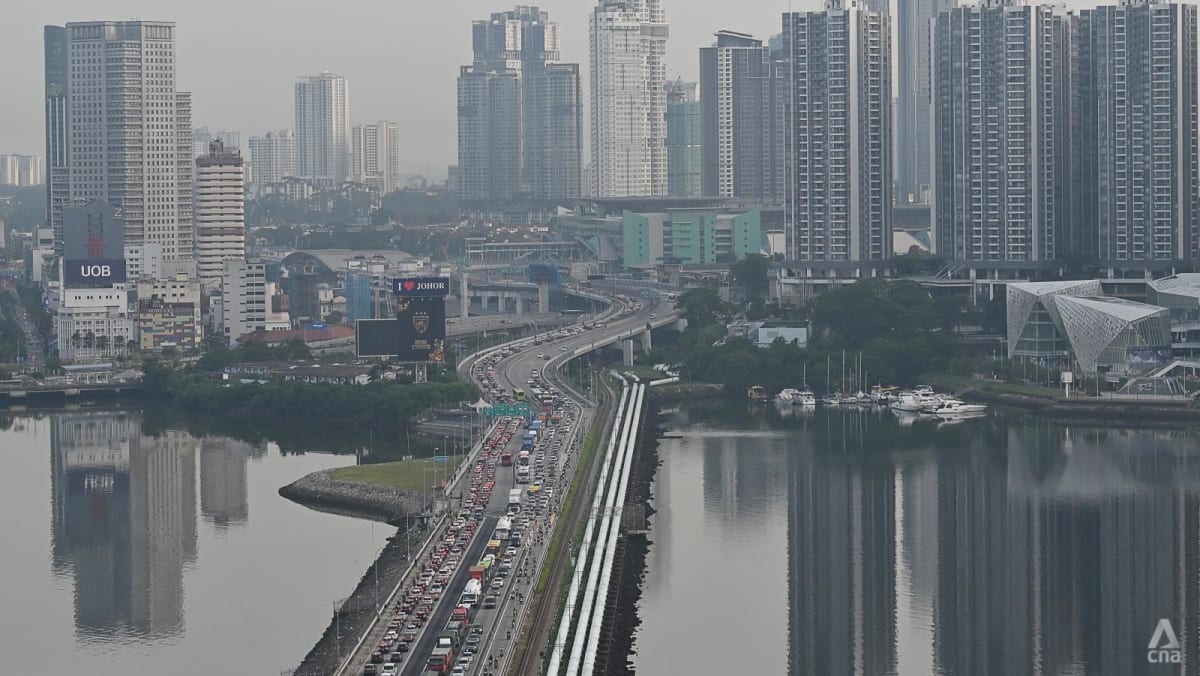SOME HAVE ALREADY SET UP SHOP
Meanwhile, electronics manufacturing firm SP Manufacturing has already opened its new facility in Johor’s Senai town, its second branch in Malaysia that can run up to four production lines for electronics.
Operating since October last year, it is the company’s latest setup in a global network of factories that includes China and Europe.
Its CEO Philip Ong said setting up in multiple locations builds operational resiliency within companies and networks.
“Having invested in Johor as well as Penang gives us this operational resiliency to meet our customers’ requirements. Because we have a second site in case of some issues or in case (we need) a backup,” he said.
He added that Malaysia has become a key part of the supply chain network in Southeast Asia, with an increasing number of semiconductor companies establishing their bases there.
“There’s a huge flow of electronics finished goods (in Malaysia), as well as all the ancillary functions that require manufacturing services,” he said.
With business partners also setting up in Johor or nearby, Mr Ong said his firm’s manufacturing lead times, production and material control, and customer service have improved.
WHY ARE FIRMS FLOCKING TO JOHOR?
Within the Singapore Manufacturing Federation (SMF), which has about 5,000 members, about 20 companies have already set up facilities in Johor even before the agreement to establish the zone was signed on Monday (Jan 6).
These companies are in the electronics and wood-related manufacturing sectors, and typically need more space and manpower for production.
A poll conducted by the federation showed around another 15 per cent of its members looking to expand their operations there.
Its president Lennon Tan said the interest is coming from midstream and downstream supply chain companies, including those in transportation and storage, as well as firms that convert raw materials into finished products.
He added this is part of their strategy to diversify, with some getting onboard the China Plus One strategy, which encourages companies to expand their supply chain and manufacturing activities beyond reliance on only China.
“Singapore businesses in these two years have been looking out for opportunities whereby they can diversify their risks… and also look at areas where they can increase their efficiency through cost effectiveness in production,” he said.
Mr Tan said the JS-SEZ is also an ideal place for firms to leverage on strengths on both sides of the Causeway – lower costs, pro-business policies and availability of resources in Johor, and robust supply chain, accessibility of capital and global connectivity in Singapore.
STILL RETAIN FOOTPRINT IN SG
Enterprise Singapore (EnterpriseSG), the agency that helps Singapore firms venture overseas, said this does not mean firms are uprooting from Singapore.
The agency’s director for Southeast Asia Lim Jing Jun said while firms are relocating parts of their businesses to maximise market benefits, most still retain their headquarters and some operations in Singapore.
For example, both agritech firm Archisen and electronics manufacturer SP Manufacturing will maintain a presence locally even as production goes to Johor.
Archisen will retain a smaller farm here which will focus on research and innovation, including studying the best ways to increase crop size.
Singapore will remain SP Manufacturing’s headquarters, as well as its centre for engineering and development work, and will lead the way for regional offices.
Mr Lim added the SEZ enhances the value proposition of both Johor and Singapore by strengthening cross border goods logistics, enabling freer movement of people, improving connectivity, and building up the business ecosystem in the region.
CONCERNS REMAIN
However, there are lingering concerns holding companies back, industry players said.
A major worry is the frequent congestion on the Causeway, which would slow the flow of goods and people, said Mr Tan.
“We also want to know after we invest, there’s really a proper authority to look after the investors, to make sure that facilitation of all the policies and so on (are smooth),” he added.
Another concern is a shortage of skilled workers in Johor, and the SMF said it is in discussions with the state’s authorities to engage in a joint effort to develop talent locally in Malaysia.
These concerns could be why some firms, particularly smaller businesses, are adopting a wait-and-see stance before considering a move into the JS-SEZ.
“They will likely be more reticent about participation too early in the stage and hedge their bets a bit,” said Mr Ang Yuit, president of the Association of Small and Medium Enterprises.
EnterpriseSG is supporting local businesses keen to tap opportunities in the JS-SEZ via the Market Readiness Scheme and Enterprise Financing Scheme, which help offset some cost incurred when venturing overseas.
